新概念英语第二册Lesson3分析解析
新概念英语第二册Lesson3分析解析
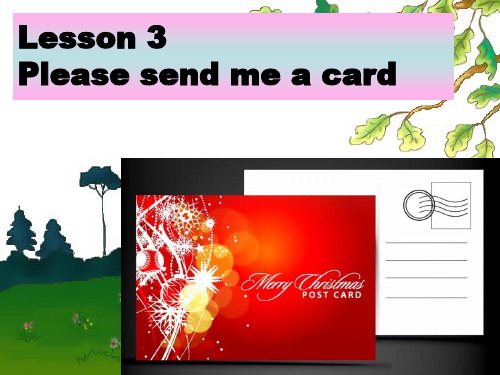
★ museum /mju:`ziEm/ n. 博物馆 Last week I went to the science museum.
扩展:the Palace Museum 故宫 the Summer Palace颐和园 the science museum 科学博物馆
★waiter n. 服务员, 招待员 • waiter(男服务员), • waitress(女服务员), 只出现在餐馆里 • chief waiter 领班 • 我要见你们的领班。 • I want to see the chief waiter. • shop assistant 商店里的店员
★single
adj. 单身的, 单程的,
1)唯一的,单一的: There wasn’t a single bus in the street. 2)未婚的,独身的:反义词 married 已婚的 例如:She is still single now. • a single bed单人床 • a single ticket单程票 • single 单一的←→ double 双倍的 • single 单身的←→married已婚的
各种卡片的英文说法
★ spoil (spoiled/spoilt) 主要指精神上的。 ① vt. 弄坏,损坏,糟蹋 这不幸的消息使我们没能过好周末。 The sad news spoiled our weekend. 这场雨把学校运动会弄得一团糟。 The rain spoiled the school sports meeting. ② vt. 宠坏,惯坏,溺爱 不能太惯孩子。 Don’t spoil your children. 这个小男孩的父母很宠爱他。 His parents spoiled the boy.
新概念英语第二册lesson-3
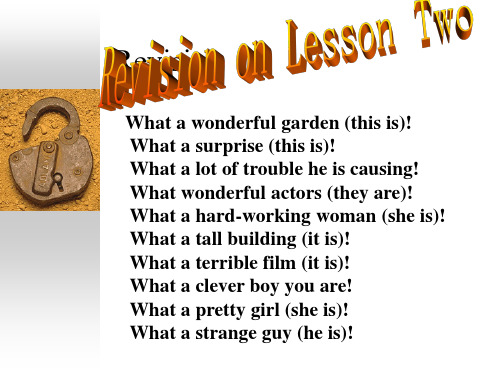
以上三个是指物理上的破坏, 而spoil主要指精神 上
Lend (lent) (lent ) v. 借出
lend sth.to sb=lend sb.sth. Can you lend 50 yuan to me? lend me your ears. 请听过我说。
public house简称pub : 酒吧 ; public place 公共场所. public lavatory ['lævətɔri】 公厕
in public:公开的; in private:私下里的 Let’s have a conversation in private. 让我们私下谈谈? Why not has a conversation in public? 为什么不公开谈呢?(当面说呢?)
Pair discussion!
Now, imagine you are having a trip overseas. And you only have 1, only 1, postcard. Who do you want to send to?
Now, everyone have 3 minutes to tell your partner. Let’s begin!
Germany German
Ireland Irish
Brazil
Brazilian
America American
Greece Greek
Canada Canadian
Australia Australian
新概念英语第二册第3课课文详解
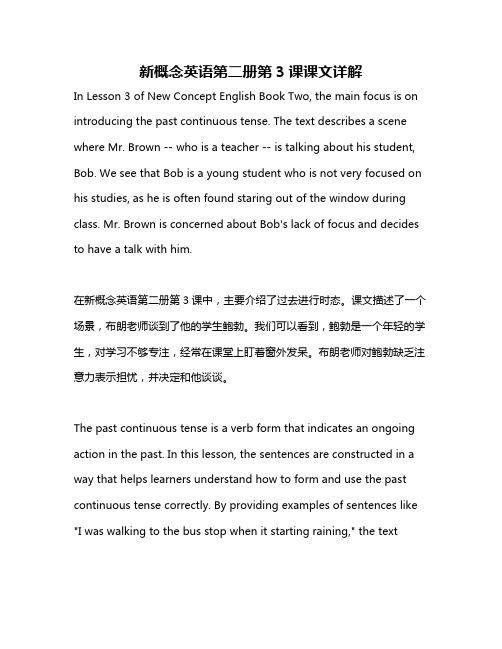
新概念英语第二册第3课课文详解In Lesson 3 of New Concept English Book Two, the main focus is on introducing the past continuous tense. The text describes a scene where Mr. Brown -- who is a teacher -- is talking about his student, Bob. We see that Bob is a young student who is not very focused on his studies, as he is often found staring out of the window during class. Mr. Brown is concerned about Bob's lack of focus and decides to have a talk with him.在新概念英语第二册第3课中,主要介绍了过去进行时态。
课文描述了一个场景,布朗老师谈到了他的学生鲍勃。
我们可以看到,鲍勃是一个年轻的学生,对学习不够专注,经常在课堂上盯着窗外发呆。
布朗老师对鲍勃缺乏注意力表示担忧,并决定和他谈谈。
The past continuous tense is a verb form that indicates an ongoing action in the past. In this lesson, the sentences are constructed in a way that helps learners understand how to form and use the past continuous tense correctly. By providing examples of sentences like "I was walking to the bus stop when it starting raining," the texthelps students see the difference between simple past and past continuous tenses.过去进行时是一个动词形式,表示过去正在发生的动作。
裕兴 新概念英语 第二册 Lesson 3 第3课 笔记讲义
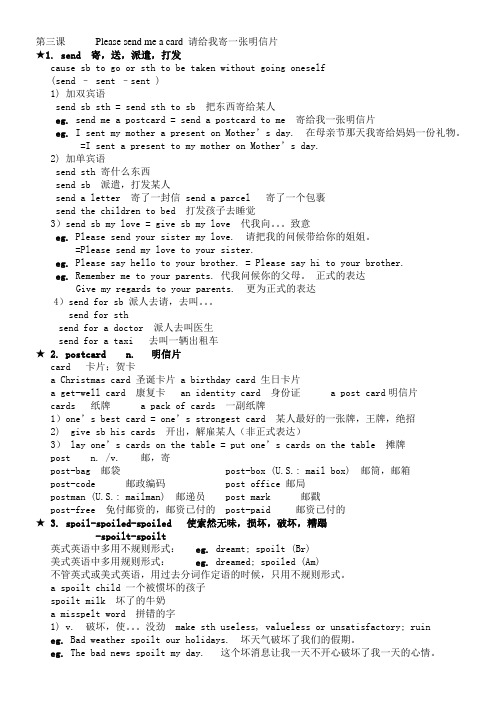
第三课Please send me a card 请给我寄一张明信片★1. send 寄,送,派遣,打发cause sb to go or sth to be taken without going oneself(send – sent –sent )1)加双宾语send sb sth = send sth to sb 把东西寄给某人eg. send me a postcard = send a postcard to me 寄给我一张明信片eg. I sent my mother a present on Mother’s day. 在母亲节那天我寄给妈妈一份礼物。
=I sent a present to my mother on Mother’s day.2)加单宾语send sth 寄什么东西send sb 派遣,打发某人send a letter 寄了一封信 send a parcel 寄了一个包裹send the children to bed 打发孩子去睡觉3)send sb my love = give sb my love 代我向。
致意eg. Please send your sister my love. 请把我的问候带给你的姐姐。
=Please send my love to your sister.eg. Please say hello to your brother. = Please say hi to your brother.eg. Remember me to your parents. 代我问候你的父母。
正式的表达Give my regards to your parents. 更为正式的表达4)send for sb 派人去请,去叫。
send for sthsend for a doctor 派人去叫医生send for a taxi 去叫一辆出租车★ 2. postcard n. 明信片card 卡片;贺卡a Christmas card 圣诞卡片 a birthday card 生日卡片a get-well card 康复卡 an identity card 身份证 a post card明信片cards 纸牌 a pack of cards 一副纸牌1)one’s best card = one’s strongest card 某人最好的一张牌,王牌,绝招2) give sb his cards 开出,解雇某人(非正式表达)3) lay one’s cards on the table = put one’s cards on the table 摊牌post n. /v. 邮,寄post-bag 邮袋 post-box (U.S.: mail box) 邮筒,邮箱post-code 邮政编码 post office 邮局postman (U.S.: mailman) 邮递员 post mark 邮戳post-free 免付邮资的,邮资已付的 post-paid 邮资已付的★ 3. spoil-spoiled-spoiled 使索然无味,损坏,破坏,糟蹋-spoilt-spoilt英式英语中多用不规则形式:eg. dreamt; spoilt (Br)美式英语中多用规则形式:eg. dreamed; spoiled (Am)不管英式或美式英语,用过去分词作定语的时候,只用不规则形式。
新概念英语第二册 NCE2 Lesson3 PPT精讲课件

e.g. Tom’s father sends him to school every day. Mary took her son to school yesterday.
ually John ___C___ to school in his father’s beautiful car. (2010 河南)
A. lent
B. discovered C. borrowed D. taught
decision
n. 决定 make a decision 作出决定
e.g. It was not easy for me to make this decision.
对我来说作出这个决定是很困难的。 Have you made a decision? 你作出决定了吗?
他总是友好的向我问好。
waiter n.
n. 服务员, 招待员
waiter(男服务员), waitress(女服务员), 只出现在餐馆里 chief waiter 领班
e.g. I want to see the chief waiter. 我要见你们的领班。
shop assistant 商店里的店员
02 New words and Expressions
send
spoill
public
single
decision
lend
send
1)send sth. to sb. /send sb. sth send a letter 寄信
2)send / take children to school
2) 接复数名词,结构不同
all+限定词+复数名词;the whole of+复数名词 e.g. All the students are here. e.g. The whole of the students went to the cinema.
新概念英语第二册Lesson3详解

Please send me a card
Revision: Lesson2
• Words
• Text • Gra2
Grammar:一般现在时
1.构成:使用动词原形,第三人称单数须有变化。 (1)直接加“s”, works,takes
(2)以辅音加“y”结尾,变“y”为“i”,再加 “es”, carry → carries
(3)以“s, x, ch, sh,o”结尾的动词加“es”, goes dresses watches brushes
2.功能: 在句中的位 (1)表现在的事实、状态或动作:置 : 实 义 动 eg: Birds fly. 词之前,非 • She loves music. 实义动词之 Mary's parents get up very early. 后 • (2)表习惯性动作或职业,常与 often,sometimes,usually,always, every week,seldom,frequently 等时间副词连用。 • eg: I always take a walk after supper. She writes to me very often. Tom and his girlfriend go out to take a picnic occasionally.
take和send的区别:
1. take强调某人亲自送。 2. send则是通过第三人去送,如校车。
B.按时间表示将要发生的动作或事件,用一般 现在时表达将来时概念。 • • The play begins at 6:30 this evening. When does the plane take off? He leaves for that city next week. According to the timetable, the express train to Shanghai starts at nine in the morning. (按照时刻表,开往上海的特快列车早上 7 点 出发。) 同样用法的动词有:go,come,leave,arrive, land,meet,die,start,return,join…
新概念英语第二册课后练习答案lesson3.doc

新概念英语第二册课后习题答案详解Lesson 3练习答案Key to written exercises1.关键句型练习答案1.关键句型练习答案A went (1.1);visited (1.2) ;sat(1.2) ;taught(1.2);lent;read(1.3) ;did not understand;thought (1.4);passed (1.5) ;did not send(1.5) ;made; go up (1.6) ;bought (1.7) ;spent(1.7) ;d id not write(1.8)C …Roy died last year…left me…spent a lot of money…bought one or two…never went to the cinema…stayed at home…listened to music…often lent CDs…they kept them…lost many CDs…2.难点练习答案1 He paid some money to the shopkeeper.2 He handed the prize to me.3 The waiter brought the man a bottle of beer.4 He sold me all his books.5 The shop assistant found me some curtain material.6 He did a big favour for me.7 She showed her new hat to her husband.8 She promised the finder a reward.9 He gave some advice to his son.10 His uncle left some money to/ for him.11 He is teaching us English.12 I bought you this bunch of flowers.13 Bring me that book please.14 He offered a cigarette to me.15 Read the first paragraph to me.16 I've ordered you some soup.17 I owe a lot of money to him.18 Pass your father the mustard.3.多项选择题答案1. c根据课文可以判断出作者不喜欢写明信片,但他很想收到别人寄来的明信片,所以应该选c.d. doesn’t like postcards 不喜欢明信片,和课文的含义不符合,所以不选d.2. a根据课文最后两句话可以判断出:作者作出的“一项重大决定”是给他的朋友们写明信片,可是还是一张没有写成,所以应该选a.3. ca. at 表示在小的地点和空间;b. to 表示方向;d. on 表示在……上;只有c. in 表示在大的空间和地方,如城市国家等,所以选c.4. a只有选a. Who taught ,这句问话才与回答相配。
新概念英语第二册Lesson-3-Please-send-me-a-card分析解析
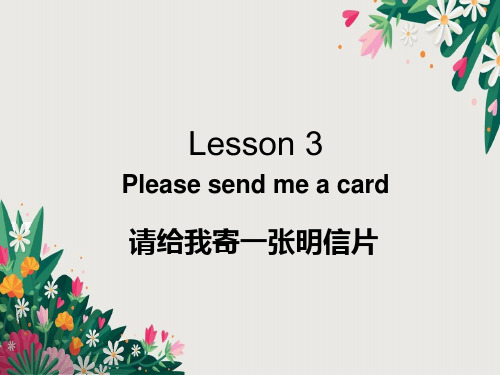
take和send的区分: take 强调某人亲自送 send则是通过第三人去送,如校车 take flowers to his wife 自己送 send flowers to his wife 叫店里的人送 类似的用法还有give,take,pass,read,sell...
• 本课重点:双宾语 • 双宾语指干脆宾语(表示动作结果)和间接宾语(表示动作目标) • 如在give sb sth中,sb是间接宾语,sth是干脆宾语
留意重音:Italy, Italian
post=letters post office, postman, postcard~~
waiter和waitress actor和actress
A friendly waiter taught me a few words of Italian.
Then he lent me a book.
holiday.
4. lend (lent,lent) v. 借给 lend to / lend out(借出) lend sth. to sb / lend sb. sth.
eg. A: Can you lend me $20 please? B: I’ll pay/give it back tomorrow.
friend n. 挚友 close friends 密友 bosom friend 知己 boy friend girl friend
make friends with sb 和某人交挚友 A friend in need is a friend indeed. 患难挚友才是真的挚友。
9. single
词一旦要加名词,前面确定要加the
all of us;all of the students
新概念英语第二册Lesson3

Notes on the Text
Postcards always spoil my holidays. Last summer, I went to Italy. last: ① adj. 上一个 last summer里的last表示 “上一个” 上周日你干什么了? What did you do last Sunday?
2.Every day I thought about postcards. think about/of 考虑, 思考 你觉得天气怎么样? What do you think of the weather today? think of 想到 你想到什么了? What do you think of? think over 仔细考虑,反复思考
borrow v. 借
borrow sth. from sb. 不能用 borrow sb. sth. (×) 他昨天借了我的笔。 He borrowed a pen from me yesterday. 如果我们使用信用卡这意味着我们从银行借 钱。 If we use credit cards it means that we borrow money from the banks.
On the whole 总的来说,一般来讲 总的来说,我同意你的决定。 On the whole, I agree with your decision. 总的来说,我部分同意这个观点。 On the whole, I agree with this opinion to some extent.
My holidays passed quickly, but I did not send cards to my friends. Pass 1)经过 我们经过该镇而未停留 We passed the town without stopping. 2)<时间>经过,过去 自从他前往法国, 已过了两年 Two years has passed since he left for France. 许多年已经过去了我仍记得这个有趣的故事 Many years has passed I still remember the interesting story.
新概念英语第二册第三课(包含课文、练习及答案)

新概念英语第二册第三课(包含课文、练习及答案)本页仅作为文档封面,使用时可以删除This document is for reference only-rar21year.March新概念英语二 Lesson 3Lesson 3 Please send me a card 请给我寄一张明信片First listen and then answer the question.听录音,然后回答以下问题。
How many cards did the writer sendPostcards always spoil my holidays. Last summer, I went to Italy. I visited museums and sat in public gardens. A friendly waiter taught me a few words of Italian. Then he lent me a book. I read a few lines, but I did not understand a word. Everyday I thought about postcards. My holidays passed quickly, but I did not send cards to my friends. On the last day I made a big decision. I got up early and bought thirty-seven cards. I spent the whole day in my room, but I did not write a single card!New words and expressions 生词和短语send v. 寄,送postcard n. 明信片spoil v. 使索然无味,损坏museum n. 博物馆public adj. 公共的friendly adj. 友好的waiter n. 服务员,招待员lend v. 借给decision n. 决定whole adj. 整个的single adj. 唯一的,单一的Note on the text 课文注释1 a few words,几句话。
新概念英语第二册+Lesson+3+Please+send+me+a+card+知识点
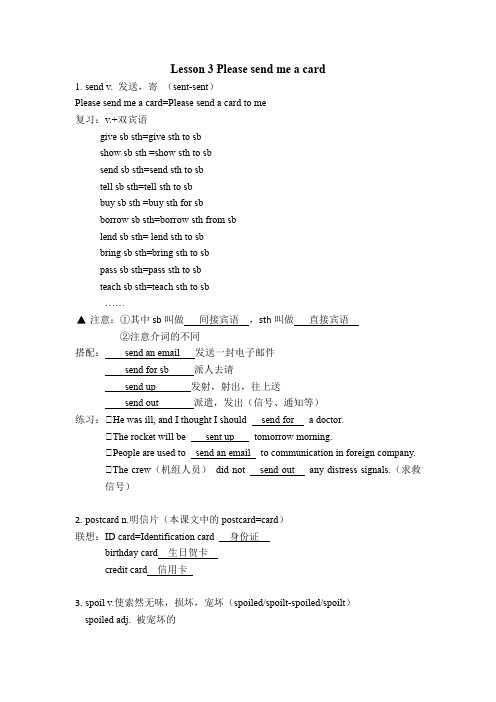
Lesson 3 Please send me a card1.send v. 发送,寄(sent-sent)Please send me a card=Please send a card to me复习:v.+双宾语give sb sth=give sth to sbshow sb sth =show sth to sbsend sb sth=send sth to sbtell sb sth=tell sth to sbbuy sb sth =buy sth for sbborrow sb sth=borrow sth from sblend sb sth= lend sth to sbbring sb sth=bring sth to sbpass sb sth=pass sth to sbteach sb sth=teach sth to sb……注意:①其中sb叫做间接宾语,sth叫做直接宾语②注意介词的不同搭配:send an email 发送一封电子邮件send for sb 派人去请send up 发射,射出,往上送send out 派遣,发出(信号、通知等)练习:①He was ill, and I thought I should send for a doctor.①The rocket will be sent up tomorrow morning.①People are used to send an email to communication in foreign company.①The crew(机组人员)did not send out any distress signals.(求救信号)2.postcard n.明信片(本课文中的postcard=card)联想:ID card=Identification card 身份证birthday card 生日贺卡credit card 信用卡3.spoil v.使索然无味,损坏,宠坏(spoiled/spoilt-spoiled/spoilt)spoiled adj. 被宠坏的注意:在英文中,现在分词(v-ing)和过去分词(done)可以作adj.修饰名词例:an interesting book一本有趣的书boiled water开水运用:Heavy rain has spoiled/spoilt my holiday.(动词过去分词)That spoiled boy always asks for everything.(过去分词作形容词)辨析:表示“损坏”的单词spoil damage destroy breakspoil 表示破坏心情,宠坏damage 强调损害后还可以修复destroy 强调损坏之后不能修复,彻底破坏break 强调“打破,打碎”练习:①After the air crash, the plane has been destroyed .①One of the visitors damaged our piano, and my dad would have it repaired.①Much homework will spoil my weekend.①Don’t break the vase.4.museum n.博物馆搭配:science museum 科学博物馆art museum 艺术博物馆history museum 历史博物馆5.friendly adj. 友好的;友善的联想:unfriendly 不友好的;不友善的friend 朋友friendship友谊运用:A friendly waiter taught me a few words of Italian.复习:n.+ly →adj.day→daily 日常的week→weekly 每周的year→yearly 每年的6.waiter n.服务员,招待员联想:waitress n.女服务员actor n.男演员/actress n.女演员host n.男主人,男主持人/hostess n.女主人,女主持人7.lend v.借给,借出(lent-lent)搭配:lend sb sth=lend sth to sb运用:He lent me a book.= He lent a book me .辨析:lend和borrowlend 表示借出去,句式是lend sb sth = lend sth to sbborrow 表示借进来,借入,句式是borrow sb sth=borrow sth from sb运用:He wanted to borrow money from me, but I didn’t lend it to him. (他想借钱,但是我没借给他)8.decision n.决定搭配:make a decision to do sth决定做某事例句:I make a decision to study hard. 我下定决心努力学习词根:decide v.决定(decided-decided)decide to do sth决定做某事例句:He decided to give me a hand.拓展:make up one’s mind to do sth.例句:Mr. Wang made up his mind to give up smoking.9.whole adj. 整个的搭配:the whole day=all the day=all day 一整天运用:the whole world 整个世界同音词:hole 洞,孔例句:He fell down the hole with carelessness.运用:dig a hole 挖洞10.single adj.唯一的,单一的,单身的搭配:single room 单人房联想:double adj.双的double room 双人房married adj. 已婚的运用:Are you single or married?I did nor even write a single card.我甚至一张卡片都没有写出来11.line n. 行,也可以表示路线,队列例句:I am repairing your telephone line. 我在修理你的电话线.The line is busy. 线路很忙Stand in the line. 排队12.a few, few, a little, little的用法①a few / few 后+ 可数名词a few 表示“有几个”,表达肯定含义few 表示“几乎没有”,表达否定含义(相当于no)②a little / little 后+ 不可数名词a little 表示“少量”,表达肯定含义little表示“几乎没有”,表达否定含义(相当于no)练习:① There are a few books in the box, and I will take out one to read.① The milk smells spoiled, and I will go to the market to buy a little .① There is a little/little water in the bottles.13.think v. 思考,考虑(thought-thought)think of vs think aboutthink of 想到,考虑,侧重于想起来,记起来think about 考虑,思索,侧重于认真思考,思索练习:①Think about it before you give your idea.①I know that guy, but I just can’t think of his name.14.on the last day 在最后一天on the first day 在第一天具体某一天用介词on练习:① in spring① on a cool autumn night① at noon/night① in June, 2004① on 1st June, 2024① on holiday15.spend v.(spent-spent)花费,度过搭配:spend sth 花费……(spend money 花钱)spend time/money on sthspend time/money (in) doing sth练习:He spends half an hour on English each day.He spends half an hour (in) learning (learn) English each day.16.时态复习:一般过去时一、定义:一般过去时用来表示过去某一时间内发生的动作或存在的状态以及过去习惯性、反复性的动作二、动词构成:was/were 或者动词过去式※注意:复习背诵动词过去式不规则变化表三、句型转换1.be动词的变化肯定句:主语+was/were+其他否定句:主语+was/were+not+其他+?一般疑问句:Was/Were+主语+其他+?特殊疑问句:特殊疑问词+was/were+主语+其他+?2.行为动词的变化肯定句:主语+动词过去式+其他否定句:主语+didn’t+动词原型+其他一般疑问句:Did+主语+动词原型+其他+?特殊疑问句:特殊疑问词+did+主语+动词原型+其他+?四、连用的时间状语yesterday, the day before yesterday, last+时间,时间+ago, just now, in 1990, at the age of ...,When I was 8...,this morning, that day, in those days等。
新概念英语第二册第三课学习笔记
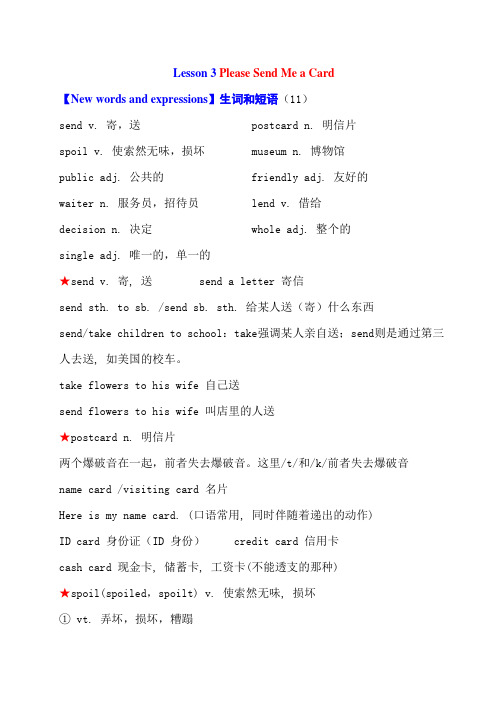
Lesson 3 Please Send Me a Card【New words and expressions】生词和短语(11)send v. 寄,送 postcard n. 明信片spoil v. 使索然无味,损坏 museum n. 博物馆public adj. 公共的 friendly adj. 友好的waiter n. 服务员,招待员 lend v. 借给decision n. 决定 whole adj. 整个的single adj. 唯一的,单一的★send v. 寄, 送 send a letter 寄信send sth. to sb. /send sb. sth. 给某人送(寄)什么东西send/take children to school:take强调某人亲自送;send则是通过第三人去送, 如美国的校车。
take flowers to his wife 自己送send flowers to his wife 叫店里的人送★postcard n. 明信片两个爆破音在一起,前者失去爆破音。
这里/t/和/k/前者失去爆破音name card /visiting card 名片Here is my name card. (口语常用, 同时伴随着递出的动作)ID card 身份证(ID 身份) credit card 信用卡cash card 现金卡, 储蓄卡, 工资卡(不能透支的那种)★spoil(spoiled,spoilt) v. 使索然无味, 损坏① vt. 弄坏,损坏,糟蹋The sad news spoiled our weekend. 这不幸的消息使我们没能过好周末。
The rain spoiled the school sports. 这场雨把学校运动会弄得一团糟。
This spoiled my day. What you said spoiled me.His arrival spoiled my holiday.② vt. 宠坏,惯坏,溺爱Don’t spoil your children.不能太惯孩子。
裕兴新概念第二册学习笔记3课解析
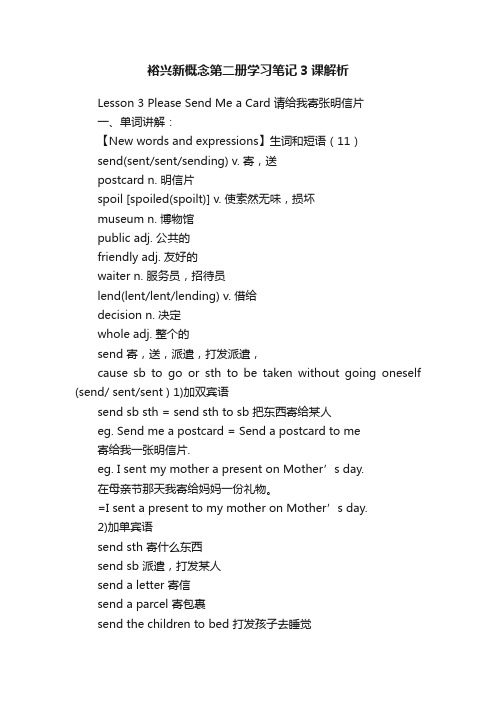
裕兴新概念第二册学习笔记3课解析Lesson 3 Please Send Me a Card 请给我寄张明信片一、单词讲解:【New words and expressions】生词和短语(11)send(sent/sent/sending) v. 寄,送postcard n. 明信片spoil [spoiled(spoilt)] v. 使索然无味,损坏museum n. 博物馆public adj. 公共的friendly adj. 友好的waiter n. 服务员,招待员lend(lent/lent/lending) v. 借给decision n. 决定whole adj. 整个的send 寄,送,派遣,打发派遣,cause sb to go or sth to be taken without going oneself (send/ sent/sent ) 1)加双宾语send sb sth = send sth to sb 把东西寄给某人eg. Send me a postcard = Send a postcard to me寄给我一张明信片.eg. I sent my mother a present on Mother’s day.在母亲节那天我寄给妈妈一份礼物。
=I sent a present to my mother on Mother’s day.2)加单宾语send sth 寄什么东西send sb 派遣,打发某人send a letter 寄信send a parcel 寄包裹send the children to bed 打发孩子去睡觉3)send sb my love = give sb my love 代我向...致意eg. Please send your sister my love. =Please send my love to your sister.请把我的问候带给你的姐姐。
新概念英语2课文解析
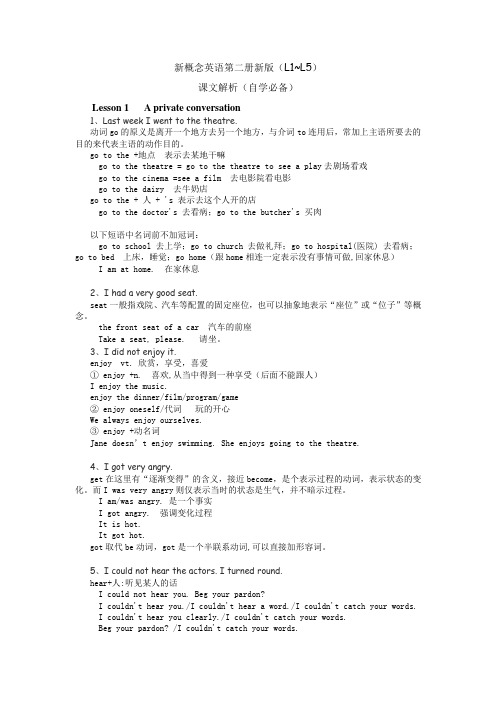
新概念英语第二册新版(L1~L5)课文解析(自学必备)Lesson 1 A private conversation1、Last week I went to the theatre.动词go的原义是离开一个地方去另一个地方,与介词to连用后,常加上主语所要去的目的来代表主语的动作目的。
go to the +地点表示去某地干嘛go to the theatre = go to the theatre to see a play去剧场看戏go to the cinema =see a film 去电影院看电影go to the dairy 去牛奶店go to the + 人 + 's 表示去这个人开的店go to the doctor's 去看病;go to the butcher's 买肉以下短语中名词前不加冠词:go to school 去上学;go to church 去做礼拜;go to hospital(医院) 去看病;go to bed 上床,睡觉;go home(跟home相连一定表示没有事情可做,回家休息)I am at home. 在家休息2、I had a very good seat.seat一般指戏院、汽车等配置的固定座位,也可以抽象地表示“座位”或“位子”等概念。
the front seat of a car 汽车的前座Take a seat, please. 请坐。
3、I did not enjoy it.enjoy vt. 欣赏,享受,喜爱① enjoy +n. 喜欢,从当中得到一种享受(后面不能跟人)I enjoy the music.enjoy the dinner/film/program/game② enjoy oneself/代词玩的开心We always enjoy ourselves.③ enjoy +动名词Jane doesn’t enjoy swimming. She enjoys going to the theatre.4、I got very angry.get在这里有“逐渐变得”的含义,接近become,是个表示过程的动词,表示状态的变化。
新概念英语第二册课后习题答案详解
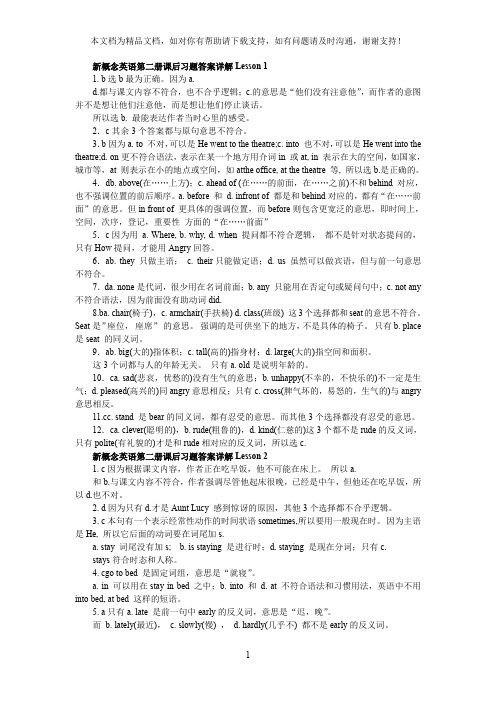
新概念英语第二册课后习题答案详解Lesson 11. b选b最为正确。
因为a.d.都与课文内容不符合,也不合乎逻辑;c.的意思是“他们没有注意他”,而作者的意图并不是想让他们注意他,而是想让他们停止谈话。
所以选b. 最能表达作者当时心里的感受。
2.c其余3个答案都与原句意思不符合。
3.b因为a. to 不对,可以是He went to the theatre;c. into 也不对,可以是He went into the theatre;d. on更不符合语法,表示在某一个地方用介词in 或at, in 表示在大的空间,如国家,城市等,at 则表示在小的地点或空间,如atthe office, at the theatre 等, 所以选b.是正确的。
4.db. above(在……上方);c. ahead of (在……的前面,在……之前)不和behind 对应,也不强调位置的前后顺序。
a. before 和 d. infront of 都是和behind对应的,都有“在……前面”的意思。
但in front of 更具体的强调位置,而before则包含更宽泛的意思,即时间上,空间,次序,登记,重要性方面的“在……前面”5.c因为用a. Where, b. why, d. when 提问都不符合逻辑,都不是针对状态提问的,只有How提问,才能用Angry回答。
6.ab. they 只做主语; c. their只能做定语;d. us 虽然可以做宾语,但与前一句意思不符合。
7.da. none是代词,很少用在名词前面;b. any 只能用在否定句或疑问句中;c. not any 不符合语法,因为前面没有助动词did.8.ba. chair(椅子),c. armchair(手扶椅) d. class(班级) 这3个选择都和seat的意思不符合。
Seat是”座位,座席”的意思。
强调的是可供坐下的地方,不是具体的椅子。
新概念英语第二册第三课(包含课文、练习及答案)
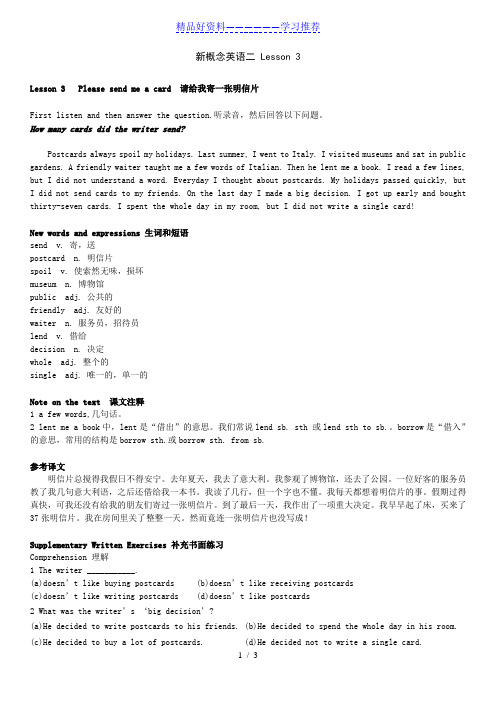
新概念英语二 Lesson 3Lesson 3 Please send me a card 请给我寄一张明信片First listen and then answer the question.听录音,然后回答以下问题。
How many cards did the writer send?Postcards always spoil my holidays. Last summer, I went to Italy. I visited museums and sat in public gardens. A friendly waiter taught me a few words of Italian. Then he lent me a book. I read a few lines, but I did not understand a word. Everyday I thought about postcards. My holidays passed quickly, but I did not send cards to my friends. On the last day I made a big decision. I got up early and bought thirty-seven cards. I spent the whole day in my room, but I did not write a single card!New words and expressions 生词和短语send v. 寄,送postcard n. 明信片spoil v. 使索然无味,损坏museum n. 博物馆public adj. 公共的friendly adj. 友好的waiter n. 服务员,招待员lend v. 借给decision n. 决定whole adj. 整个的single adj. 唯一的,单一的Note on the text 课文注释1 a few words,几句话。
新概念英语第二册Lesson 3

Lesson 3 Please send me a cardPhrase:1. in public gardends 在公园里2. on the last day 在最后一天3. every day 每天4. make a decision 决定5. think about 想到,想6. not a single 连一个都没有Intensive Reading:1.but是连词,用来连接两个简单句,表示转折关系,它前面一般要用逗号点开。
but决不能与(al)though连用,注意中英文的区别。
eg. She was tired, but she went to work. (√) Although she was tired, but she went to work. (×) 2.spend 花费,度过,经常与on连用。
eg. Roy spent a lot of money on records.spend 常用句型为:spend…doing/ on sth. eg. He’s spent half his life writing this book.3.think about 意为“考虑”,think后不能直接加名词作宾语,而要借助合适的介词。
eg. think about a question 想问题,think of you 想你。
但think后加句子时不需介词,eg. I think he will come soon.4.make a big decision 意为“下大决心”,英语中make和take是两个搭配能力很强的动词,后接名词可组成许多不同的词组,但一般来说make和take不可互换使用,而分别与一定的名词搭配。
eg. make the bed, take a rest .Key Structure:1.一般过去时:A. 用法:描述已经执行和完成了的行为动作,但与现在的情况没有联系,而且必须跟确切的时间状语连用。
- 1、下载文档前请自行甄别文档内容的完整性,平台不提供额外的编辑、内容补充、找答案等附加服务。
- 2、"仅部分预览"的文档,不可在线预览部分如存在完整性等问题,可反馈申请退款(可完整预览的文档不适用该条件!)。
- 3、如文档侵犯您的权益,请联系客服反馈,我们会尽快为您处理(人工客服工作时间:9:00-18:30)。
score card 积分卡
membership card 会员卡(资格)
intelligence card IC 智能卡
entry card 入境卡
★ spoil (spoil ed/spoil t) 主要指精神上的。 ① vt. 弄坏,损坏,糟蹋 这不幸的消息使我们没能过好周末。 The sad news spoiled our weekend. 这场雨把学校运动会弄得一团糟。 The rain spoiled the school sports meeting. ② vt. 宠坏,惯坏,溺爱 不能太惯孩子。 Don't spoil your children. 这个小男孩的父母很宠爱他。 His parents spoiled the boy.
night . 4 Danny _____(read )English five minutes ago . 5 I _____(see)Li Lei ____(go) out just now . 6 He ____(do)his homework every day. But he
__(not do)it yesterday . 7 When I was young, I _____(play)games with my
中考链接: Is it polite to speak and laugh loudly____? No, I don't think so. A. in public B. at least C. on time D. /
答案:A
★friendly adj. 友好的 friendly 是形容词,单独使用时一般做定语。 a friendly face/smile She gave me a friendly greeting. be friendly to /towards sb. 他对约翰不友好。
★public /'p?blik/ adj. 公共的 ① adj. 公共的,公众的,社会的 There is a public library in this town. ② adj. 公开的,众人皆知的 他们的秘密会晤20年以后才被公开。 Their secret meeting was made public 20 years later. in public 公开的;in private 私下里的 Let's have a conversation in private. We are good friends in private. ③ n. 公众,群众,大众 The museum is open to the public on Sunday.
friends. 8 When ____you_____(write)this book?
I _____it last year . 9 Did he____(have) lunch at home? 10 I _____(eat) the bread, I 'm full now.
单词学习
send postcard spoil museum public friendly waiter lend decision whole single
v. 寄,送 n. 明信片 v. 使索然无味,损坏 n. 博物馆 adj. 公共的 adj. 友好的 n. 服务员,招待员 v. 借给 n. 决定 adj. 整个的 adj. 唯一的,单一的
★send v. 寄, 送 寄信 send a letter send sth. to sb. /send sb. sth. 给某人送(寄)什么东西 send /take children to school 1. take 强调某人亲自送。 2. send 则是通过第三人去送 .
各种卡片的英文说法
credit card 信用卡
cash card 现金卡, 储蓄卡, 工资卡(不能透支 的那种)
birthday card 生日卡
Christmas card 圣诞卡
New-Year card 新年卡
Identity card 身份证
ID card
身份证
student card 学生证
14、 注意我 15、 转身 16、乘火车
17、 躺在床上 18、 向窗外看
19、不管你的事
20、 多黑的一天呀!
1 They____(be) on the farm a moment ago . 2 There____(be)a shop not long ago . 3 Jenny____(not go)to bed until 11:00 o'clock last
与send 搭配的常用短语
send for 召唤,派人去叫 Did you send for a taxi? 你刚才叫出租车了吗?
send out 发出,发送 send back 归还 send in 提交ostcard n. 明信片
eg. Every year I can receive some postcards. send him a card name card /visiting card 名片 这是我的名片 Here is my name card. (口语常用, 同时伴随着递出的动作)
送花给妻子: take flowers to his wife 自己送 send flowers to his wife 叫店里的人送 Tom's father sends him to school every day. Mary took her son to school yesterday.
Lesson 3 Please send me a card
请给我寄一张明信片
根据中文写出相应的英文:
1、忍受 2、无礼地,粗鲁地 3、直到
4、外面 5、姑,姨 6、 重复
7. (铃、电话等)响 (原形、过去式和过去分词)
8、私人的 9、 谈话
10、 座位
11、 去剧院 12、大声交谈 13、 变得生气
